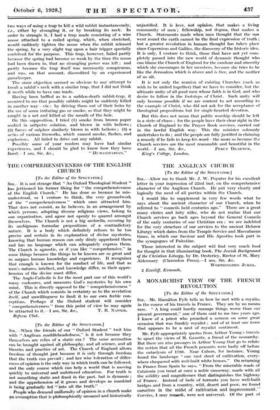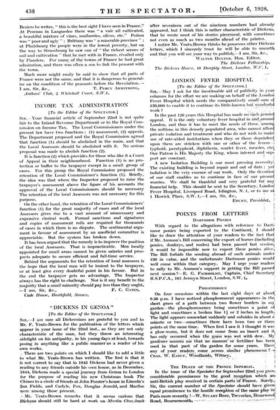A MONARCHIST VIEW OF THE FRENCH REVOLUTION
[To the Editor of the SPECTATOR.]
SIR,--Mr. Hamilton Fyfe tells us how he met with a royalisb in the course of his travels in France. They are by no means rare. " A king could hardly manage things worse than our present government," one of them said to me two years ago. I know of a priest who preached a sermon on some great occasion that was frankly royalist ; and of at least one town that appears to be a nest of royalist sentiment.
Mr. Fyfe appropriately quotes from Arthur Young's travels to upset the views of M. Gaxotte, a friend of the monarchy. But there are also passages in Arthur Young that go to refute the notion that all the French peasants were badly off before the cataclysm of 1780. Near Cahors, for instance, Young found the landscape one vast sheet of cultivation, every- where chequered with well-built white houses." On returning to France from Spain he says, " From the miserable roads of Catalonia you tread at once a noble causeway, made with all the solidity and magnificence that distinguishes the highway of France. Instead-of beds of torrents you have well-built bridges and from a country, wild, desert and poor, we found ourselves in the midst of cultivation and improvement." Corvees, I- may remark, were not universal. Qf the part of Beziers he writes, " this is the best sight I have seen in France.r At Pezenas in Languedoc there was " a vale all cultivated, a beautiful mixture of vines, mulberries, olives, etc." Poitou was " poor and ugly " ; Brittany was " a miserable province " ; at Phalsbourg the people were in the lowest_ poverty, but on the way to Straskbourg he saw one of " the richest scenes of soil and cultivation " that he met with in France, rivalled only by Flanders. For many of the towns of France he had great admiration, and there was often a son to link the peasant with the town.
Much more might easily be said to show that all parts of France were not the same, and that it is dangerous to general- ize on the condition of the peasants before the Revolution.—























































 Previous page
Previous page